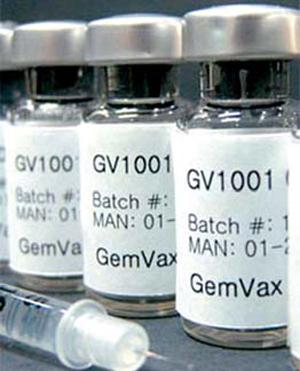
Gemvax & KAEL said Tuesday that it has published the anti-cancer effect of GV1001 in two internationally renowned journals -- Endocrine-Related Cancer and Critical Reviews in Oncology/Hematology.
Professor Kang Keon-wook Kang and his team from the College of Pharmacy and Research Institute of Pharmaceutical Sciences at Seoul National University published the first paper, titled “Anti-cancer effect of GV1001 for prostate cancer; function as a ligand of GnRHR,” on the Endocrine-Related Cancer.
The study proves that GV1001 is a novel ligand for gonadotropin-releasing hormone receptor (GnRHR) and acts as an agonist on GnRH receptors.
Also, Professor Kang confirmed the inhibition of tumor growth by injecting GV1001 into animal models transplanted with prostate cancer cell lines, which coincided with the mechanism of action of GV1001 in increasing the function of GnRH receptor activation and the apoptosis of tumor cells.
“The results of this paper possess significance in demonstrating that it has verified the mechanism of action of GV1001 on GnRH receptors, which in turn, has confirmed its mechanism in hormone-related cancers such as benign prostatic hyperplasia and prostate cancer,” the company said. “The fact that GV1001 directly suppressed tumor tissues without intervening with the immune system in genitourinary cancer, such as prostate cancer, highlighted its potential as a therapeutic agent for genitourinary tumors.”
Italian oncologists Francesco Carrozza and Matteo Santoni published their paper on “Emerging immunotherapeutic strategies targeting telomerases in genitourinary tumors” in Critical Reviews in Oncology/Hematology.
The two oncologists claimed that catalytic subunit human Telomerase reverse transcriptase (hTERT) is effective in treating genitourinary cancer such as renal cancer, bladder cancer, and prostate cancer.
The paper focused on how telomerase’s activity and telomere’s length play essential roles in the initial stages of various illnesses including genitourinary tumors.
Such tumor cells and the surface of those tumor sales overexpress telomerases. However, when the telomerase degraded peptides expressed on the surface of a tumor cell interact with the immune cells and active and passive immunity using hTERT it has an anti-cancer effect in the genitourinary cancers.
The authors also underlined the crucial role of telomerase during the genitourinary tumors occurrence and proliferation while stressing how telomerase, especially hTERT-specific immunotherapy will become a suitable treatment for such tumor groups.
“The effect of GV1001 on GnRH receptors is of great significance as it describes the mechanism of action for benign prostatic hyperplasia as well as the development of therapeutic agents for prostate cancer,” a company official said. “Also, with the second paper mentioning that GV1001 can contribute to the inhibition of cancer cell proliferation through passive and active immunity, the company believes it will help accelerate the development of such drugs.”

